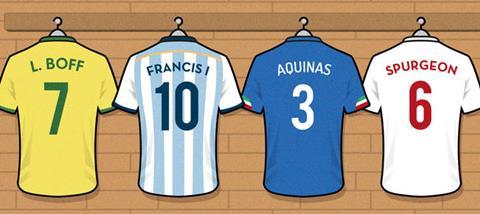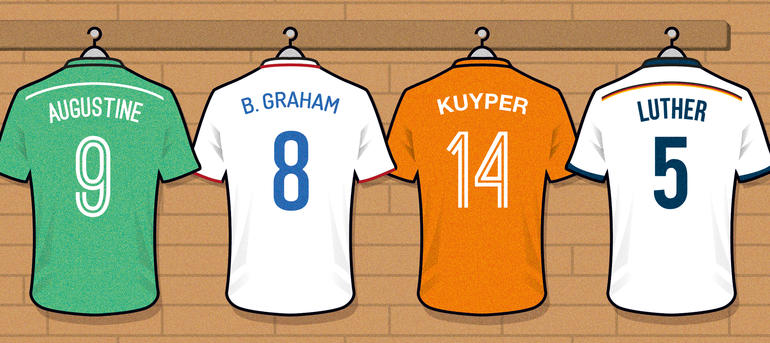
You probably don’t care about the World Cup.
Statistically speaking, the festival of football currently taking up every television screen, advertising space and water-cooler conversation in the land is not of interest to the majority of people. While viewing figures reflect millions of excited fans, only about a third of the UK population will even watch a game in this tournament. So, if football isn’t your thing – and even now your interest in this article is hanging by the thinnest of threads – you’re not alone.
Having said that, the level of interest among those who do care about it, is (depending on their favourite team’s progress at the time of reading this) potentially stratospheric. For the football fan, the World Cup is the pinnacle, not only of the game, but of leisure time itself. I count myself among those who on New Year’s Eve, upon realising that we’re about to enter an odd-numbered year (and therefore one without a major summer football tournament), feel a sense of sadness akin to hearing that a much-loved pet has died.
In church, however, not everyone feels quite as rosy about football as I do. Some may view it as a distraction, and thanks to the popularity of Sunday league football and televised Sunday games, football can also be seen as a competitor.
Right now, England is firmly divided into two camps: those who think Messi is one of the Mr Men, and those whose prayer lives are currently focused on Wayne Rooney’s feet. If you fall into the former group, it could be worth turning your attention to the world of football – if only briefly. Here’s why.
A PLACE OF BELONGING
Every weekend around 750,000 people attend an English league football match, with hundreds of thousands more visiting Scottish clubs.
Why do they go? For a variety of reasons – and the variable entertainment of following their team is just one of them. Football fans also look for a sense of belonging, both in a physical place and the community of people around them. They enjoy rallying behind a leader (unless he’s lost their faith); they find an outlet for their emotions and their need for physical human contact. They want to find ways to express devotion to a cause – from getting tattooed to singing and chanting. Football fans invest a portion of their income (for some, far more than 10%) in the club they attend. In case you hadn’t quite spotted the link – I could easily be describing the worshippers in a really good church.
Like it or not, football is a central part of modern British life, and as such, there’s much to be gleaned from it.
Football creates a context for likeminded people to mobilise around a cause. They campaign for more funds from the board to spend on transfers; they create and sell ‘fanzines’ outside the ground on match days. To the average non-Christian, church is a power structure with no entry point for the outsider. Many churches are getting better at offering degrees of participation, but could we advertise this more effectively? Do we bill our churches not just as places to come to, but communities to get involved in?
You don’t have to love football to recognise what it does well, in bringing people together, allowing them to participate, offering them shared purpose and even a kind of spirituality. We can all learn from these community hubs, popular, and in many cases growing, all over the UK.
IF FOOTBALL COACHES RAN CHILDREN’S MINISTRY
One of sport’s great attractions is that it is participative and fun. Could this be said of our youth and children’s ministries? A friend once remarked on how it was becoming increasingly difficult to persuade his ten-year-old to attend church instead of joining his friends at Sunday football training. In one context, his son was being asked to sit still, listen and learn; in another he was being shown how to do something and then being released to do it.
If football coaches ran youth and children’s ministry, they’d spend the majority of their time practising skills, rather than explaining them. They’d show young people how to pray, then get them praying; they’d explain prophecy to children, then invite them to prophesy. More than that, they’d ensure there was time for ‘match practice’; taking those young trainees out on the street to pray for people, or into the adult church to serve or lead the main congregation.
SPIRITUALITY IN THE STADIUM
Every year on the closest weekend to 15th April, fans of Liverpool and many other clubs observe a minute’s silence in memory of the 96 who died at the Hillsborough stadium disaster.
A similar scene is found at most clubs whenever a former player or staff member dies. The players unite with the fans; many close their eyes, all but an unfortunate few are totally quiet and still. They reflect, taking a moment to think about things bigger than themselves. Perhaps they even pray. It happens all the time, and yet we Christians rarely notice it; a moment of spiritual yearning in the heart of popular culture.
Listening to Liverpool fans sing ‘You’ll Never Walk Alone’ is a spine-tingling experience, partly because of those stadium-disaster connotations, but also because of the sense of unity it evokes. Many teams have a song that is almost a hymn, from West Ham’s ‘I’m Forever Blowing Bubbles’ to Manchester City’s ‘Blue Moon’; they encapsulate a sense of history, togetherness, and perhaps even reverence.
So, the spiritual may not be quite as far removed from the pitch as you might have thought. Yet the Venn diagram of church and football attendance shows no great cross-over. Football is male dominated for a start; certainly not true of church. Football is also popular among working class and poorer communities; another area in which the Church is consistently struggling to connect. Could football fans – this group of people gathering in weekly congregations, building community, worshipping and putting their money where their mouth is – be the great untapped mission field of the UK?
ENGAGE IN THE GAME
Footballing events such as the World Cup create a great ‘hook’ on which to hold community events and hang preaching illustrations. Church leaders can appear impressively culturally relevant during a tournament by throwing in the occasional reference to what’s been happening on the pitch, and in a game dominated by wannabe messiah-figures it’s not hard to find gentle biblical parallels. The story of
David and Goliath, for instance, is so relevant to footballing encounters that it’s become a go-to phrase for commentators reporting on an apparent mismatch.
But we also need to demonstrate to football fans that the things that attract them to a stadium on a Saturday afternoon can perhaps also be found in that old building at the end of their road on a Sunday morning.
Every FA Cup Final day, my late grandfather would stand up and sing along with ‘Abide with Me’, the hymn traditionally sung before kick-off. He wasn’t in any way a religious man, yet this profoundly Christian song left him with tears in his eyes. It’s moments like these with which we can – and must – connect. Football has so much to teach the Church, and it’s loved by a group of people who would probably like us too if they got to know us. We need to listen to them, and to love them. The World Cup presents a great opportunity for us to do both.
World Cup Mission
Carl Beech shares his top tips on using the World Cup as a missional opportunity
Get a licence to host a screening at your church. You don’t need to have a talk; you’re just creating a warm environment for people to come together. Put on food and drink and consider holding a five-aside game.
For a morning game, host a screening accompanied by bacon butties. For an evening game, hold a quiz night and show the game afterwards. Have evangelistic resources available. Try the free, downloadable quizzes and Bible studies at the Christians in Sport website.
If you are going to host an event with a talk, don’t necessarily do a Bible preach. Just tell stories. Use the World Cup to talk about competition, risk, adventure and God – the Bible is full of risk and overcoming challenge. We don’t talk about those things enough.
CARL BEECH is the director of Christian Vision for Men































